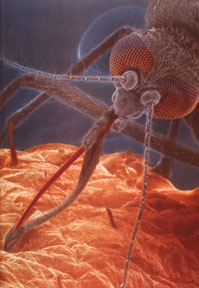 |
 |
|
 |
 |
 |
 |
 |
|
 |
 |
 |
 |

The Trager Lectures
 |
|
A female Anopheles mosquito
biting a human. Anopheles is the
vector for malaria. Photo credit: Irwin Sherman |
|
A Symposium to Honor a Lifetime of Contributions by Dr. William Trager to the Study of Malaria
Saturday, June 18, 2005 - Lillie Auditorium, 2:00 PM.
Irwin Sherman, Ph.D., Professor of Biology Emeritus, Department of Biology, University of California, Riverside - "Plasmodium: Discovering principles of parasitism for the rational design of drugs and vaccines"
Larry Simpson, Ph.D., Principal Investigator, Howard Hughes Medical Institute and Professor, Microbiology, Immunology and Molecular Genetics, University of California, Los Angeles - "Uridine insertion/deletion RNA editing as a paradigm for site-specific modifications of RNA molecules"
David Fidock, Ph.D., Associate Professor, Department of Microbiology and Immunology, Albert Einstein College of Medicine of Yeshiva University - "Investigations into the molecular basis of chloroquine resistance in the malaria parasite Plasmodium falciparum"
An open-air reception on the Swope patio will be held following the Symposium.
For additional information, contact series coordinator Trish Halpin at thalpin@mbl.edu, or host Steve Hajduk, Director of the Global Infectious Diseases Program in the Marine Biological Laboratory's Josephine Bay Paul Center at shajduk@mbl.edu.
Support from the Burroughs Wellcome Fund is gratefully acknowledged.
Dr. William Trager died in January 2005 at the age of 94. Dr. Trager's contributions to the emergence of parasitology as a modern discipline is well recognized and his success in the cultivation of Plasmodium falciparum ranks as one of the single most important advances in parasitology. In addition, Dr. Trager was instrumental in the development of the American Society of Parasitologists and served as president of both the American Society of Parasitologists and the American Society of Tropical Medicine and Hygiene.
|
| |
 |
|
 |
 |
|